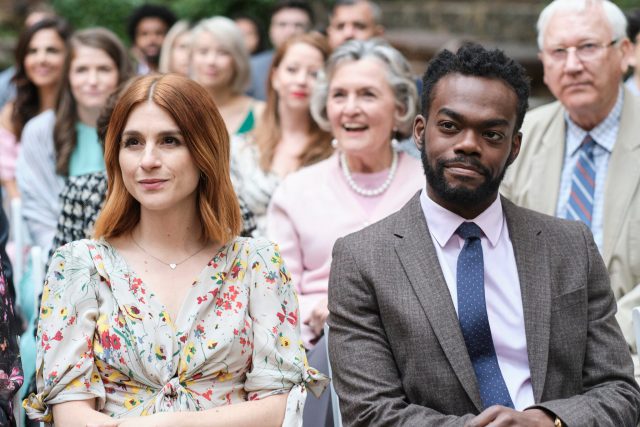We Broke Up: Plus None, by David Bax

We tend to develop relationships to sitcom characters that are slightly different than the ones we forge with other fictional people, probably because their main purpose is to make us smile. So it can be especially difficult to adjust to seeing them in new roles, as we do with You’re the Worst‘s Aya Cash and The Good Place‘s William Jackson Harper in Jeff Rosenberg’s We Broke Up. But maybe the problem is just more pronounced in this case because these new roles give the actors so little to work with and place them in a hacky premise that would have been beneath either of their former TV shows.
Mere days before Lori (Cash) and Doug (Harper) are to embark on a weekend trip to attend Lori’s sister’s wedding, Doug proposes and, in response, Lori vomits. They break up but, not wanting to disrupt the ceremony, decide to attend anyway and pretend to still be together. Wackiness ensues, I suppose, though that generally has more to do with Lori’s sister (Sarah Bolger) and her fiancé (Tony Cavalero), an oddball couple who met in Australia and bonded over both having spent summers as a kid at the Lake of the Ozarks, a bizarrely specific detail that already gives these two more of a backstory than our main couple have.
We Broke Up is nominally a comedy but doesn’t manage to mine many laughs from its two mopey leads. Instead, Rosenberg sweatily works up some forced antics like a daylong drinking game that promises more fun than it delivers. The rest of the “jokes” are just made up of deadpan deliveries and establishing shot tableaux (both things that You’re the Worst did extremely well, which only highlights the gap in quality).
There’s a hint at the movie We Broke Up could have been when Lori and Doug check into their cabin and Lori struggles with whether or not to lock the bathroom door while she showers. That’s a fresh and well-observed signifier that feels like it ought to have been one of many in a comedy of discomfort about a couple breaking up in slow motion, a vision of a relationship as a rotting corpse that’s still walking around. That bit of character, though, leaves the film as quickly as it arrived.
Also underexplored is the underlying dialectic about what it means to have a successful romantic relationship. The friction between the assumption that anything other than a marriage that lasts until death is a failure and the suggestion that it’s not necessarily a bad thing for two people to have run their course together and parted comes too late and is resolved too easily.
Maybe that’s simply as deep as Rosenberg was able to go. After all, when Doug and Lori go off on their separate, self-reflective nighttime wanderings, We Broke Up can’t think of anything better for them to do than, respectively, stare at the sea and sadly ride a carousel alone. Come to think of it, those two scenes might be the funniest in the whole movie.




























